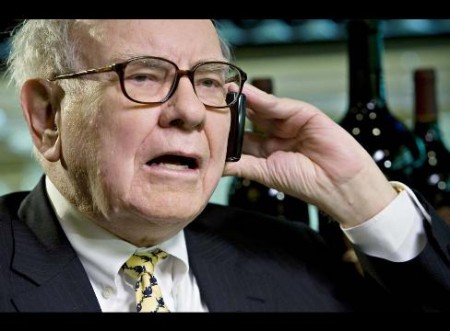Nov. 19 (Bloomberg) — Warren Buffett‘s Berkshire Hathaway Inc. fell the most in at least 23 years, dropping for the eighth straight day since reporting a 77 percent decline in third- quarter profit.
The stock plunged $11,550, or 12 percent, to $84,000 in New York Stock Exchange composite trading and has slipped 41 percent this year, compared with the 45 percent drop in the Standard & Poor’s 500 Index. Berkshire, based in Omaha, Nebraska, rose in 17 of the past 20 years.
“There’s nothing fundamentally wrong with Berkshire, what’s really happening is people are wondering if there’s something fundamentally wrong with the economy, and Berkshire is in some ways a bit of a proxy for that,” said Michael Yoshikami, president of YCMNet Advisors in Walnut Creek, California, which manages $850 million including Berkshire shares.
Berkshire has posted four straight profit declines, the worst streak in at least 13 years, on falling returns at insurance businesses and investment losses. Buffett, ranked by Forbes magazine as the richest American, has committed at least $28 billion this year to acquire companies, finance buyouts and purchase securities as prices fell and competitors were hobbled by limited access to credit.
Berkshire’s shareholder equity, a measure of assets minus liabilities, fell by about $9 billion in October on declines in debt and equity markets, the firm said Nov. 7. American Express Co., the credit-card company that is one of Berkshire’s top 10 stock holdings, plunged 47 percent since Sept. 30 as borrower defaults increased. Wells Fargo & Co., Berkshire’s No. 2 investment, dropped about 35 percent.
`Under Pressure’
“Many of the companies Berkshire owns, such as American Express, are under pressure,” Yoshikami said. “What you’re seeing is a systematic de-leveraging process taking all financials down, including good-quality financials.”
Berkshire shareholders including Mohnish Pabrai, head of Pabrai Investment Funds, have said investors are concerned about losses on the company’s $37 billion bet on world equity values more than a decade from now. Buffett sold contracts to undisclosed counterparties for $4.85 billion protecting the buyers against declines in four stock indexes including the S&P 500.
Under the agreements, Berkshire will pay as much as $37 billion if, on specific dates beginning in 2019, the indexes are below the point where they were when he made the agreements. By Sept. 30, Berkshire had written down the contracts by $6.73 billion as the S&P declined for a fourth straight quarter.
Credit-Default Swaps
The cost to protect against Berkshire being unable to meet its debt payments, based on credit-default swaps, has more than tripled in two months.
The swaps jumped to 475 basis points today from 129 points two months ago, according to CMA Datavision. That translates to $475,000 a year to protect $10 million for five years.
Jackie Wilson, a spokeswoman for Berkshire, didn’t immediately return a message seeking comment.
To contact the reporters on this story: Hugh Son in New York at [email protected]; Linda Shen in New York at [email protected]
Last Updated: November 19, 2008 17:58 EST
By Hugh Son and Linda Shen
Source: Bloomberg
